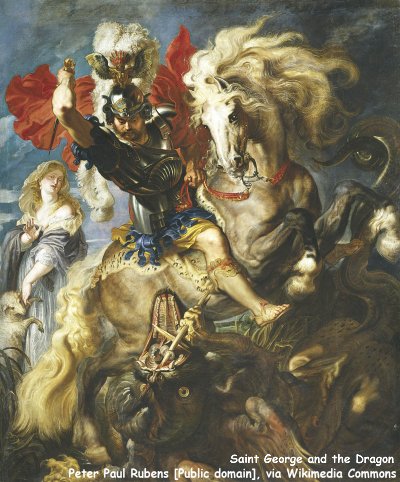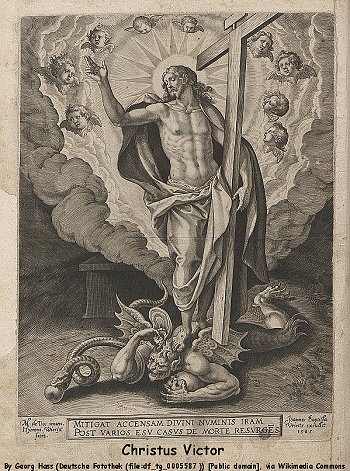The work of our hands is however dedicated to our Lord and Savior Jesus Christ in whom we have found the greatest warrior for life and good.
We find within the Western Martial Tradition an appeal and aspiration to much that is honorable, valorous, virtuous and spiritual: these things being embodied and expressed in the way of Chivalry.
"The knight is a man of blood and iron, a man familiar with the sight of smashed faces and the ragged stumps of lopped-off limbs; he is also a demure, almost a maiden like, guest in hall, a gentle, modest, unobtrusive man. He is not a compromise or happy mean between ferocity and meekness; he is fierce to the nth and meek to the nth. When Launcelot heard himself pronounced the best knight in the world, "he wept as he had been a child that had been beaten", [...]
The ideal embodied in Launcelot is "escapism" in a sense never dreamed of by those who use that word; it offers the only possible escape from a world divided between wolves who do not understand, and sheep who cannot defend, the things which make life desirable."
~C.S. Lewis, Present Concerns, "The Necessity of Chivalry" (1st published in Time and Tide, Aug. 1940)
The way of Chivalry
| It seems that a new knighthood has recently appeared on the earth. It ceaselessly wages a twofold war both against flesh and blood, and against a spiritual army of evil in the heavens. ~Bernard of Clairvaux In Praise of the new knighthood (De Laude Novae Militiae, c. 1130) The intent of the Western Medieval Martial philosophy is much more than just the ability to acquit one's self creditably on the field though it began as that (courage, endurance, loyalty, prowess at arms); in its maturity it is a way of life that at its best brings into being true manhood: faith, goodness, courage, justice, honor, compassion, mercy, wisdom, integrity, self-control. There are those that believe that true manhood can be obtained on one's own terms but that is not the way of Chivalry; it was born in and of a Christian society and to try to cut Chivalry from its root will destroy the tree that grew from it. The Western Medieval Knight could not conceive of his world in any other terms than Christian. He may not interpret his Christianity as a modern person would and many did not live up to the ideals of Chivalry or Christianity (however one must be careful here to not be guilty of deconstructionism, for many more were true to its ideals than is often related in most treatments of the subject) nonetheless they knew no other basis for their out look than the Cross. The sword itself became a symbol of the Christian Cross in the Medieval period. And as with most medieval blades there are two edges of the way of Chivalry, ferocity and meekness. | |  |
Ferocity is the attribute that gives pause for many and for some is totally incompatible with the Christian religion[1], Christ did say 'turn the other cheek' and 'bless those that curse you' after all. However He also said 'I came not to bring peace but a sword', He also premeditatively made a whip and cleared the temple (an occurrence that gives commentators great problems), He also told His disciples just before he was arrested to sell their cloak (one's most important garment) if need be to buy a sword (another problematic passage for expositors). Not to mention all the times he expressed great outrage and anger towards
 | | the religious leadership of His day for their
legalism and lack of compassion. And finally we see in the book of Revelation Jesus
coming back on a white horse His robe dipped in the blood of the
martyrs with a sword coming out of his mouth slaying all those who had
slain His brethren and had done evil in the world. This does not even address His interactions with warriors of His time, the constant use of martial terms in reference to the faith in the New Testament (many not translated as such in the English), nor all the stories of valor and fierceness in the Old Testament that are attributed as 'Godly' and the passivity that passes today as meekness as contemptible. It is interesting to note that the Old Testament is universally held to be true revelation by the Christian Church but much of the church is uncomfortable with much of what it says. In conclusion when we look at the core tenant of the Christian Faith - the atonement - we find that much of the church (all the early fathers of the faith, the Eastern Church, much of the Catholic Church and some Protestants) holds that Jesus was and is a warrior who defeated Satan and all of God's and man's enemies in His incarnation, life, death and Resurrection; taking the keys of death and hell from the Devil, making a mockery of him, his minions and all power and authority that opposed God and oppressed and held captive His creation, leading out a train of captives behind Him. Taking these examples seriously makes it clear that the idea of fierceness is not alien to the Christian faith and does not pose a contradiction between the Christian faith and Chivalry. Meekness. Here if we understand the meaning of the original Greek of the New Testament we find that the supposed |
There is much more that could be said concerning the truth of the way of Chivalry as it relates to its Christian roots but suffice it to say that it is only a certain pacifistic interpretation that does not honestly deal with vast tracks of the Bible that has a real problem with the code of Chivalry. It must also be said that Chivalry is not just a lot of romantic notions that have not and will never be truly practiced. As Lewis has stated it is a set of principles to be 'aspired' to with all diligence for the good of all mankind.
That said, the modern adherent of the way of Chivalry does not pledge his sword and life to his earthly king (the true practitioner of Chivalry does however pledge his all to his Eternal King) of course if one is in the military or in law enforcement there is that element even though his chosen weapon for service would not be the medieval sword. However as with the soldier or law enforcement officer the Chivalric civilian does swear an oath to justice, honesty, integrity, honor, compassion and if one cares to really uphold the truth of these words he will find ample opportunity in the normal course of his life pursuits to practice and fulfill the demands of Chivalry.
We are very happy to be a part of the resurgence of interest in the Western Martial Arts and the study of the civilization that it developed in and was so much an integral part of as well as the philosophical and spiritual aspirations that grew and developed in the thinking of the medieval world. There is much that is good and worthy in the history of Western Civilization. Even with all its mistakes, for those of us of European descent, it is our mother and we owe it to at least understand where we came from, to break through all the miss-interpretations and the deconstructionism that has clouded the reality of this era for so long.
_______________________________
[1] For many (even in the church itself) the idea of a Church Militant is a frightful specter. Much of this is attributable to an overblown historical deconstructionism which has created an almost mythic distortion of what the Medieval Era was really like with a negative judgement of the whole period that is quite unsupportable, especially in light of the 10s of millions slaughtered in the last century that were not connected with anything even remotely qualifying as a Holy War much less a Christian Holy War (unless one takes the view that the millions of Jews and Christians persecuted unto death make these wars and slaughter a war 'against' the Holy). Over 100 million persons were sacrificed on the alter of socialism alone which has no god but man and even reduces him to mere matter in motion, a tool of the state (its true God if it has one is the State). The Gospel 'rightly' interpreted and practiced only brings justice, mercy, liberty and peace. However it isn't pacifistic especially in the face of injustice and evil. That said, its primary weapon is the 'Sword of the Spirit, which is the Word of God', that is making an appeal to that Glory man was created with, no matter how wounded and/or twisted and darkened it has become, calling him to remember who he is and the Glory he is meant for.
[2] Spiros Zodhiates, Th. D.